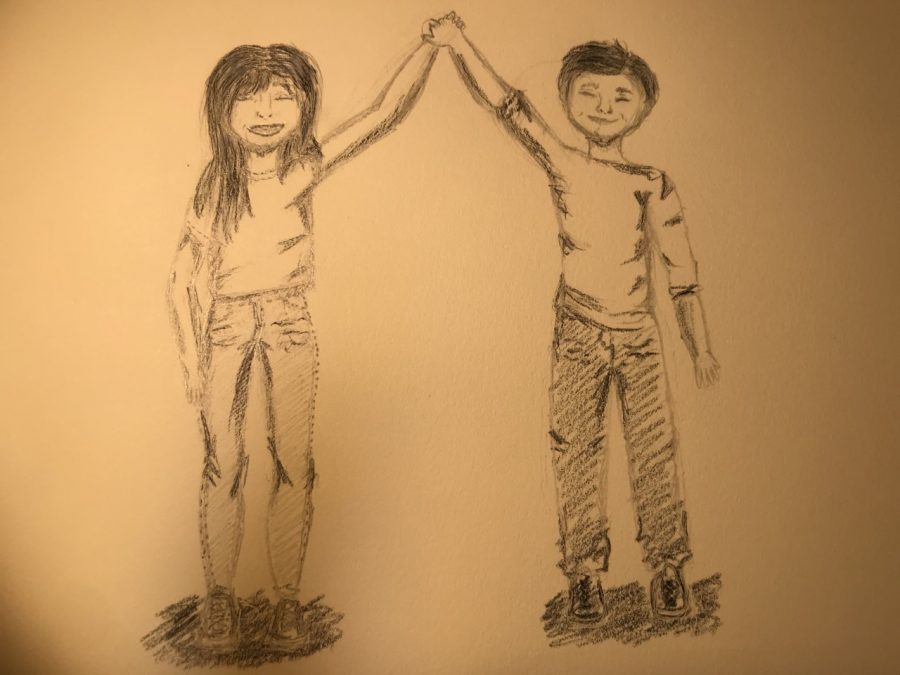How Misogyny in Latinx Culture Harms All Teenagers
January 23, 2020
A Mexican household in Michoacan was dominated by the father. When his wife refused to do something, she would be shamed for having her own opinion. He didn’t want her to pursue a career. Her sole purpose was to have kids, cook, clean, and provide loving support. At times, Maria, their daughter, would witness acts of domestic violence. I am Maria’s daughter, and I have grown up 2,119 miles away in Marin County, California — in a house where the man’s word used to be the law.
Even today, while I know my experience may be different from someone else who is Latinx, I believe that my culture can be degrading to women, creating an atmosphere in which girls can feel oppressed for being themselves. I also think it can force men to fit into a stereotypical mold of masculinity, to deny themselves emotions. This is evident in the halls of SRHS. Latinx students make up a majority at SRHS. Many of them have grown up in homes like mine and my mother’s.
Latinx culture isn’t awful because of this one aspect. It cannot be limited to a discussion of misogyny (dislike of women) and masculinity, which doesn’t have to mean that. Many cultures in America have a misogyny problem. It stands out to me from what I have observed growing up, because it’s not discussed as openly as it might be in other cultures. I’ve grown up identifying as Latinx; I value the importance of family bonds in my culture. That doesn’t mean I don’t see a problem.
My belief in the misogyny present in my culture begins with my experience as well as my mother’s and classmates’. When both of my parents were still together, my father would do anything he pleased and if my mom said anything about it, he would get very upset. For example, if he had his family over for days and if my mom said anything, he would scold her. With time, my family has learned the negative effects of gender roles and steered away from that.
Like me, Danna Pasos and her family came from Mexico. Pasos is currently a sophomore. She explains how this can affect young girls. She says, “The most recent use [of] slang and terms for women is very disrespectful. Our generation has words like slut or other degrading words in Spanish to say to a woman.” She believes that it has faded away a little bit in the current generations.
Lili Peixotto is a sophomore and her mother came from Mexico as well. She observes in SRHS’s halls that, “In a lot of straight romantic relationships between two Latinxs that I see in school, the guy is usually the dominant one, pushing the girl around and telling her to do things. Even if the girl says she doesn’t want to do it, she’ll do it anyway.”
From the number of students I interviewed, a junior at SRHS, Gretzam Zabek, was raised by a Polish father and a Nicaraguan mother. She mentioned to me that gender roles governed her life too, although she was raised differently.
Zabek says, “I felt as if my older brother was pretentious and looked down on me when we were both younger, not in the way that a sibling would normally look down on each other because they’re younger. She adds, “He always carried himself as someone that had more status than me.”
Mr. Oseguera is one of SRHS’s counselors. His family descended from Michocan, Mexico. He tells me that machismo comes from men’s insecurities and in Latinx culture, men are taught to suppress their emotions. He says, “When emotional situations come up, instead of feeling, you act in a repressive way to others.”
Boys and men should deserve to feel, cry, and be expressive because that’s what makes us all human.
Jonathan Deras, the Boys and Young Men Educator at the Center for Domestic Peace, explains how the need to be masculine affected him. His family came from El Salvador. His parents survived and experienced the civil war in El Salvador, meaning that all the older men in his family had participated in combat. He says, “When I was 17 (and attending SRHS), this influenced my decision to join the military. I did not hesitate to join. At the time, I believed that participating in combat would give me a place at the table amongst the men in my family.”
One of the programs he is apart of is called the Champion Men’s Zone program. He says, “It is a year-long conversation that engages boys and young men in topics of masculinity and how it affects intimate relationships and violence against women.” He says that the program will soon be coming to SRHS.
Eleam Rodas, a senior who is Guatemalan, believes that the expectations from parents may affect young Latinx men because they are expected to be the man of the house. He says, “This puts a lot of pressure on us and it’s scary because what if we don’t reach that expectation.”
Judy Schwerin, the bilingual therapist at SRHS says,“If going against the norms wasn’t something you saw, grew up with, or had in your daily life, it could definitely contribute when you come to school because you may think differently and participate in some of those negative behaviors.” She’s right because I witness so many students who are ignorant towards the reality of the norm they are living in.
There was a 2016 study done by the American Physiological Association to find the correlation between the sociocultural system and emotional distress. It says, “Results revealed that specific components of machismo and marianismo (the idea of the submissive feminine woman) were associated with higher levels of negative cognitions and emotions.”
It is not just harmful for women, but also men. A study was done by the Manhattan Alcoholism Treatment Center to find the correlation between alcoholism and machista behavior. They find that, “Widespread acceptance of the machismo ethos and its determining role in the structure, dynamics and value systems of the traditional family encourage alcohol abuse by men.”
In other words, the acceptance of machista behavior in the traditional family ultimately encourages men to abuse alcohol because they’re supposed to put on a facade that they are manly. Alcohol is seen as masculine, as opposed to speaking with others about your emotions.
The acceptance of machista behavior can lead to women being treated unfairly. Another study was done by the APA to show how culture values may obscure the need to report incidents of domestic violence. It says, “Gender role ideologies, respect for authority, and [many other factors] operate in different ways to obscure and justify acts of sexual assault and intimate partner violence to maintain silence when such acts do occur.”
Meaning that when such acts do happen, the need to stay pure and consistent in their gender roles interferes with reporting these incidents.
Everyone, including SRHS, should be educated on how embedded these gender roles are and should continue to prevent the harmful effects of them.
Gerardo Mata, a junior, states his opinion by saying, “Women’s role in society has changed.”
However, Mata does feel irritated and upset when he does see things that degrade women of any background. He believes that women should be seen equally because they have the same abilities as men.
This aspect of gender roles is still apparent in America, even if one does think it has been watered down significantly.
Mr. Oseguera adds on by saying, “It doesn’t completely go away, maybe somewhere down the road. Each generation gets watered down a little bit which is great, but it just doesn’t go away fast enough.”
Zabek mentions this is the way of the older generations and it’ll continue that way until we reach equality.
Elizabeth Alvarez, a senior sex educator at Huckleberry, says, “It starts by creating a healthy emotional intelligence — allowing men to feel emotions and [creating] a space for conversations on how we can be allies to the women in our society [and] on how we can be better human beings overall by recognizing it.”
There are a variety of ways in which women are respected. For example, in some Latinx households, you can sometimes find strong women making the final decisions.
As Ms. Herrera, a ceramic teacher at SRHS says it perfectly, “There is a strong woman in the background somewhere, right? It’s either a grandmother or your mom or somebody who’s got the string of the puppet. Really, they’re the ones running the show.”







































John Hazelhurst • Nov 6, 2024 at 7:49 pm
UDATE: Is Latino culture misogynistic? See the results of the 2024 Presidental election, and the answer is a resounding YUP. Thanks a lot guys. Great job.